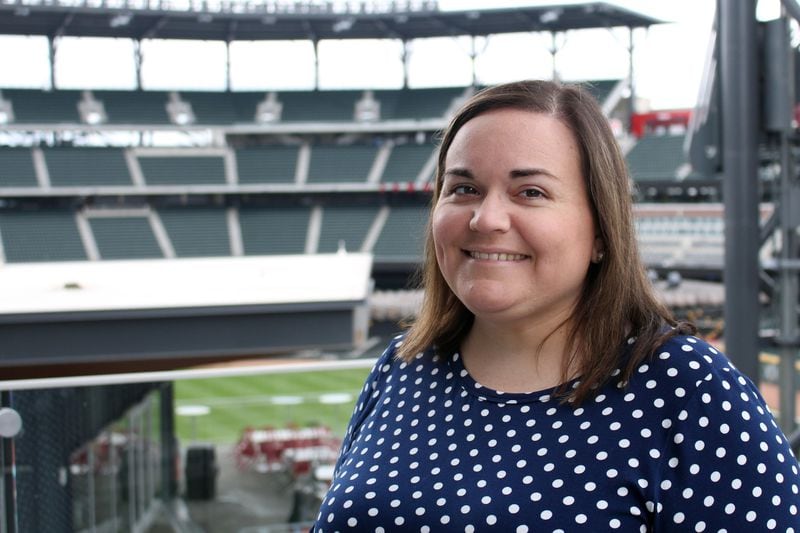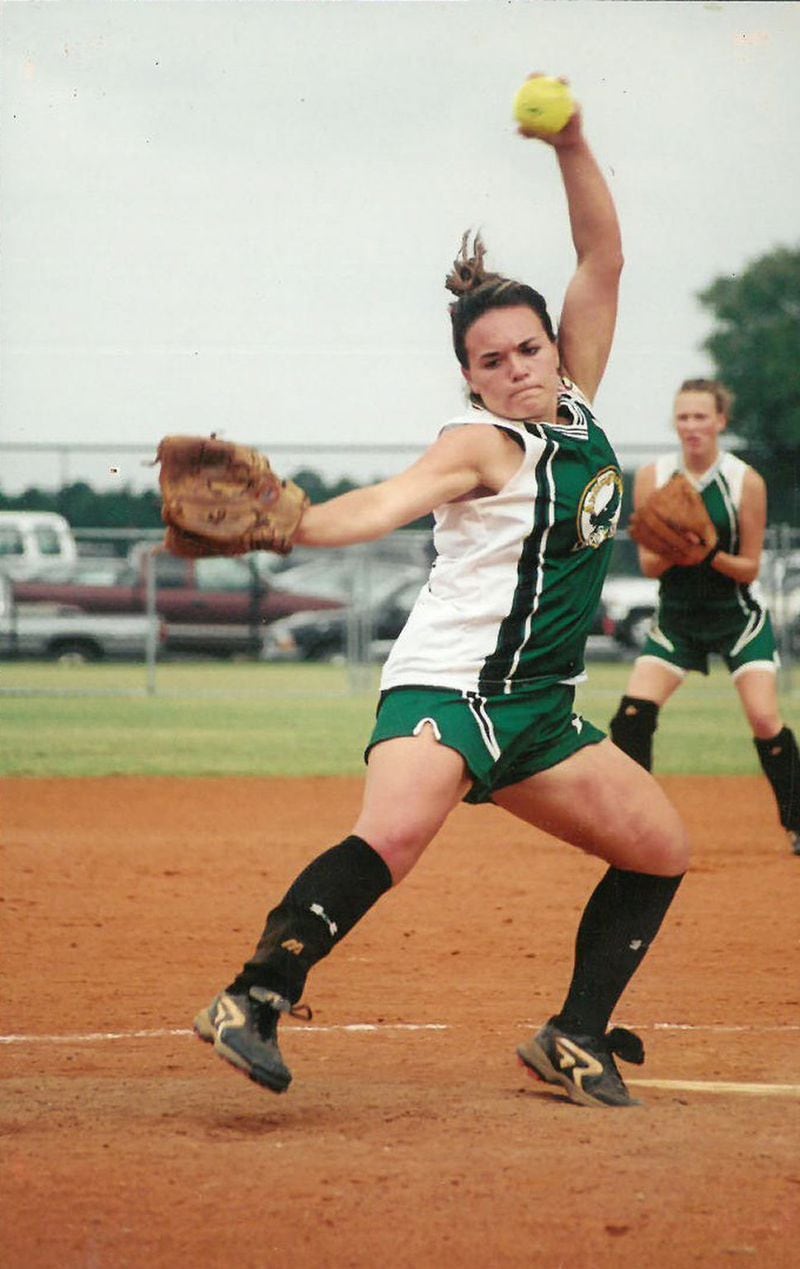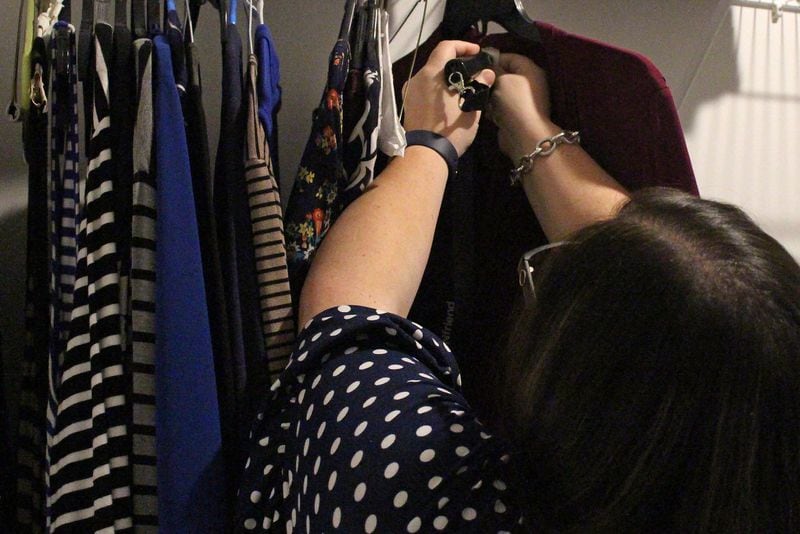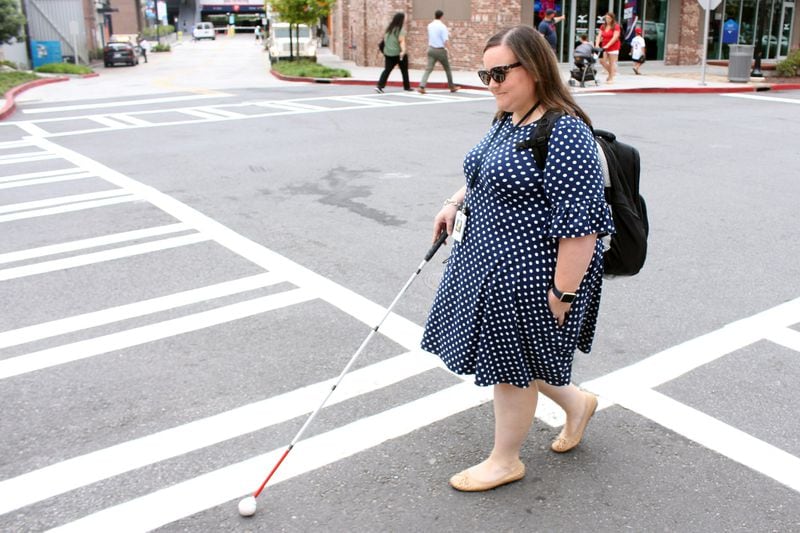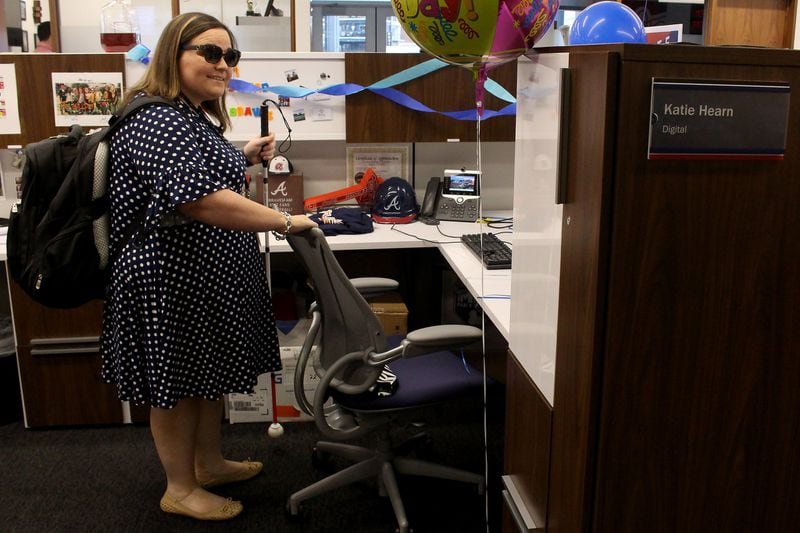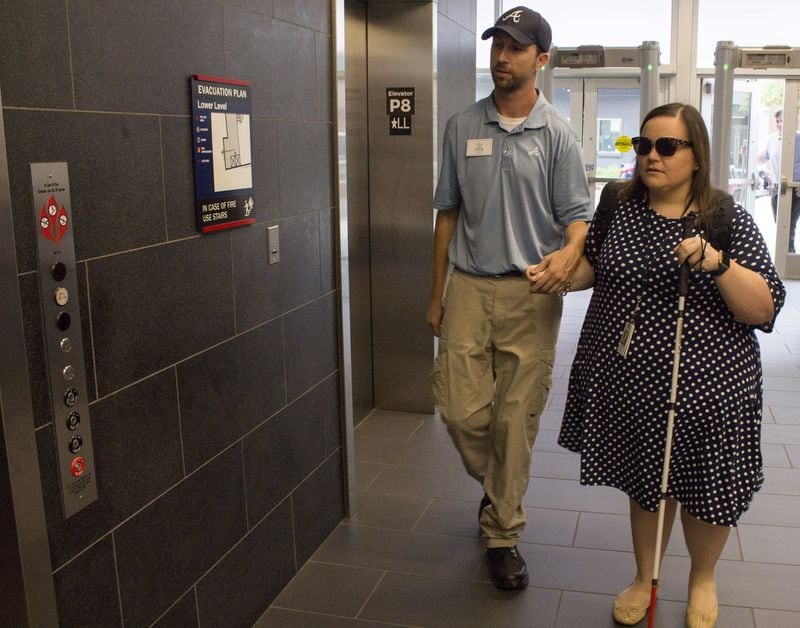Two years ago, Katie Hearn landed her dream job with the Atlanta Braves.
As an intern, the lifelong Braves fan loved interacting with fans and demonstrated an uncanny ability to problem solve — even before a game ended. She replaced bobbleheads that were missing bats, surprised fans with visits from the team mascot, took steps to alleviate unusually long lines for hot dogs.
So it was no surprise when Greg Mize, senior director of marketing and innovation for the Atlanta Braves, offered Katie a full-time job in the fall of 2016.
“She had this desire to make the game day experience as perfect as it could be,” said Mize. “To say she excelled is an understatement.”
But within six months, Katie’s job — and life as she knew it — was in grave jeopardy. It started with Katie’s eyes feeling unusually tired, and severe headaches. And then, at just 28 years old, Katie started going blind.
In early April of last year, Katie couldn’t find the door handle for a meeting at work. She decided she had no choice but to step away from her job.
A doctor told her she might want to find another career, but Katie refused to even consider changing jobs.
“I couldn’t fix my vision,” said Katie in a recent interview, “but I could figure out a way to keep living and do what I really care about.”
That would mean figuring out a way to return to and keep working with the Atlanta Braves — no matter how many challenges might lie ahead.
Great gig, then hard choice
Katie grew up in Palmetto, Ga., and played softball starting with T-ball, playing through her middle and high school years and then playing in college at LaGrange College. She was a pitcher, not known for the speed of the pitch as much as putting a good spin on the ball.
Braves games always played in the background at home, and she and her parents went to a few games every season.
While in college, Katie interned with a radio station that set up a booth at Braves games. She enjoyed talking to fans and being at the games. After college, she taught middle school history for a couple of years, but kept thinking about the radio internship. At the end of the 2014-15 school year, she resigned from teaching and secured an internship with the Braves.
At first, she made a smooth transition into her full-time job monitoring social media for the Braves.
But then came the headaches with her eyes feeling heavy. Katie set up an appointment with an ophthalmologist. The woman who never needed glasses read the letters off the eye chart with ease. But the exam revealed a swelling of the optic nerves. She was then diagnosed with pseudotumor cerebri, a rare disorder related to high pressure around the brain due to too much spinal fluid.
Katie lost her peripheral vision. And then her eyesight continued to narrow, like a kaleidoscope getting smaller, and it was as if the scope of her sight was just a dot, reduced to the size of a pencil top. She could see shadows and shapes, and some color — especially royal blue and bright yellows.
And just as SunTrust Park was opening last year, Katie stepped down to focus on her health and try to get better. The Braves organization encouraged Katie to do what she needed to do, and told her they would welcome her back as soon as she was ready to return.
Katie tried medications, and she underwent an optic nerve surgery and a shunt was placed in her head to drain extra spinal fluid in the skull. The surgery also protects the eyes from pressure buildup. Her headaches went away. And her eyesight seemed to perk up shortly after surgery but quickly dimmed.
Preparing for ‘a new normal’
Pseudotumor cerebri rarely leads to blindness like it has for Katie.
Katie faced a new reality — she would likely never be able to see again. Katie moved back into her parents’ home in Palmetto. And Katie focused on doing whatever it takes to live fully and independently, and to keep doing the job she loves.
“When I realized my vision was not going to return, and I was going to have to learn a new normal, I made a choice to not let it define me,” she said. “There were two factors I could control: attitude and effort. Being positive and working hard to use the strengths I still have were, and continue to be, a priority.”
She started going to vocational training to help with mobility and daily living skills, and two days for technology and job assistance to help her return to the workforce. Her parents kept a close watch, nervous to leave her home alone at first.
“It was terrifying because as a parent, you always want to fix what happens and this was beyond all of our control, and came out of nowhere. The first few months, we were trying to survive and hoping and praying the vision would come back,” said Katie’s mother, Heidi Hearn. “And once we realized it wasn’t coming back, Katie was so strong. She was just like I have to do what I have to do.”
Early on, when her mom headed out to do errands, Katie realized she was prepared to tackle daunting challenges.
Before leaving, her mom mentioned sheets in the dryer. Katie wondered if she could make a bed herself, and decided to find out. She slowly made her way to the laundry room, gathered up the sheets, and little by little, made the bed. She felt the hems of the fitted sheet and matched them with the corners of the bed. She then placed the flat sheet on top, tucked the bottom under the mattress. She checked along the length of the mattress to smooth out wrinkles on both sides of the bed. The bed was made in about 15 minutes.
Katie also folded laundry, researched resources for the visually impaired and put together a plan to move forward. Her mom said she knew her daughter was going to be OK. And Katie knew she wasn’t starting her life over, she was only making adjustments.
“I realized I was not reinventing the wheel, I was just needing new techniques,” she said.
She continued to go to training classes for four months, learning everything from how to get dressed, hold a knife, cook, to learning how use a screen reader and other methods to use a computer. She also learned how to navigate SunTrust Park. Learning assistive technologies was a key component to learning how to do her job. She started with learning how to use Job Access with Speech, commonly abbreviated as JAWS, a screen-reading computer program which allows her to “read” what’s on the screen by converting several components of the Windows operating system into speech.
Daniel Chrismer, an access technology trainer who works with Georgia Vocational Rehabilitation Agency, said the process begins with learning how to navigate websites, and use the program for emailing, and then over time, Katie learned more difficult tasks such as sorting and organizing emails into different folders, and creating Excel spreadsheets.
In January, Katie was ready to live independently again. She moved into an apartment just steps away from SunTrust Park. She was also ready to return to the Braves.
The Braves staff was thrilled by her return, with Mize saying, “We always knew she would come back.”
Katie continues to meet with Chrismer every week.
He gives Katie homework every week — helping her memorize commands and learn computer shortcuts. She spends hours every night practicing new skills.
“She’s a real go-getter,” Chrismer said. “One of the toughest things for people who lose their vision later in life is they can be hard on themselves, and it can be tough emotionally, but Katie’s done a tremendous job keeping her head up.”
Chrismer said Katie will complete the training by the end of the year.
She also changed doctors, leaving the one who suggested she change professions. She found herself a new doctor who is not only supportive but “in awe” by Katie’s determination.
While Katie will likely never regain her sight, her doctors don’t anticipate she’ll experience other negative health effects associated with the rare condition.
“What do you do when you get smacked in the face with adversity?” said Dr. Nancy Canter Weiner, a neuro-ophthalmologist. “You can say woe is me or you can gather that inner strength and resilience and do what you need to do to move forward. Katie really stepped up to do what she needed to do. She is an exceptional person. She truly is an inspiration to everyone.”
Back to work with Braves
On a recent morning, Katie, who is now 30, wakes up to an alarm set by Alexa, a virtual assistant developed by Amazon, at 7 a.m. She says good morning to Alexa, asks for a weather report, and then asks Alexa to play 680 AM The Fan, a radio station which has been part of Katie’s morning routine for several years.
She gets ready for work in her tidy, cheerful apartment. Already a neat person, she must now be highly organized, putting everything in the same place. Shampoo always goes in one spot; conditioner always to the right. Gone are the days of slipping off shoes anywhere. They must now go in the same spot every time — on the right side of a closet near the door.
She uses a “Pen Friend” label reader to help her get dressed. Here’s how it works: With the help of a friend, she records her voice to describe an item, and then attaches the label to the clothing. And then, by simply pointing the pen-shaped Pen Friend device to the item of clothing, the device reads the description back — a short-sleeved top with polka dots or long-sleeved burgundy dress more suited for fall.
She continues to learn new skills and gets faster at everyday things. She can now change the sheets and make her bed in seven minutes.
On the recent morning, Katie walks down a single flight of stairs onto a sidewalk. She trails the wall with her long cane, and after a short jaunt, she pauses and listens for traffic before crossing. She then touches a string of silver bollards — 17 of them. She counts them one by one, and when she gets to the last one, she steps to the right, and after a few steps, she arrives at the entrance to the executive offices.
When she gets to her desk, she takes her seat, turns on her computer and gets to work. She wears a headset to listen to words on the screen, and with the help of Velcro dots on her computer, she types her messages. She scrolls over her responses to make sure they are correctly typed before sending.
MORE: A special photo project: Uno, the therapy dog.
On this day of a rare double-header with the first game at 1 p.m., she spots a post on social media: I called at 10:05 a.m. and then 11:30 a.m. and no one picks up. What gives?
She turns to a colleague, and without hesitation, she says, “I’ll ask them for their number and call them.”
Her desk is neat — a red foam Tomahawk, a Chipper Jones bobblehead still in the box, a few photos on a bulletin board.
Katie usually joins colleagues in a conference room during games, and together they will troubleshoot whatever happens during games — everything from complaints about long lines at a concession stand to fans asking for special requests for birthdays. When they learned about a fan flying from Michigan to see Braves outfielder Adam Duvall, they surprised her with a baseball signed by Duvall. When a fan commented he had purchased a ticket package for the Chipper Jones mug but was unable to make it to that game, Katie and her team personally delivered the mug to the fan when they learned he would be at another upcoming game.
Since Katie interacts with fans primarily online or by phone, they likely have no idea she’s blind.
On Aug. 16, a father posted on Twitter about going to a much-anticipated game with his young son: asked "1000x times about Acuna's boo boo" on the 9 hour drive to SunTrust Park. Never Happier to see a line up card."
Katie sent a message back to find out where they were sitting and had Guest Services surprise them with a Blooper mascot bobblehead.
And when a fan complained about having to walk a long distance to get water for a service animal and then the water would spill out of the bowl, Katie made sure there is always a water bowl set up for service dogs even before the game. (Guest Services usually gets a heads-up when a service dog will be at a game. But even if they don’t know ahead of time, ushers have been instructed to call Guest Services, and a staff member will quickly bring water to the fan and the service dog.)
>> RELATED: Fans with autism get special treatment at Braves game
Embracing a new chapter
Katie said people often ask her if she misses driving, but she said she’s found alternatives to driving from point A to point B.
She says she misses other aspects of her life that require precise vision. A detailed note taker, she misses jotting down notes with pen and paper. She misses little things like curling her hair. And yes, she misses seeing a ballgame.
But she’s adjusting, changing the way she experiences the game and life. She can now tell the size of a hit by the roar of the crowd — from the tamed cheering of a single to a thunderous roar of a triple to the crackling fireworks for a home run. She listens to every game — Jim Powell and Don Sutton for home games, Powell and various co-hosts for away games.
Mostly, she’s feeling hopeful, grateful. She hopes to inspire others to chase your dreams, and it’s never too late to start a new chapter.
Soon, Katie will be getting a service dog. Her Braves co-workers donated money, and they raised enough money to cover two dogs. (They gifted the other dog to someone in need of a service dog.) Katie's dog is named Banks (after longtime Braves usher Walter Banks, who is a close friend of Katie's).
>> RELATED: Walter Banks looks back over his 50 years with the Atlanta Braves
Katie is the only full-time employee with the Braves who is blind and one of only a few staffers who are visually impaired.
Her reputation, her future and her life seem to have little to do with her being blind.
“We always knew Katie was a once-in-a-lifetime talented individual,” said the Braves’ Mize.
And he always knew Katie would be back.
“I knew she wouldn’t allow anything else,” he said.
Fittingly, earlier this week, the Braves named Katie the 2018 Walter Banks Award recipient in a pregame ceremony. The award is given annually to a game day staff member who exemplifies extraordinary customer service in the mold of Banks, who is closing out his 53rd season.
